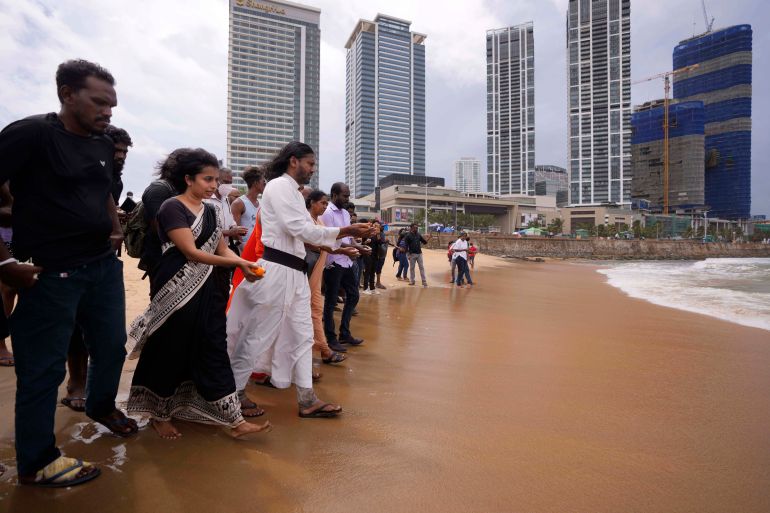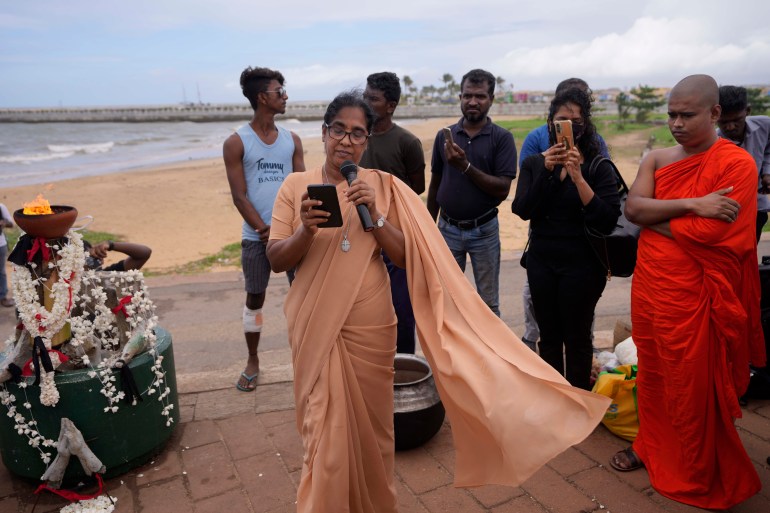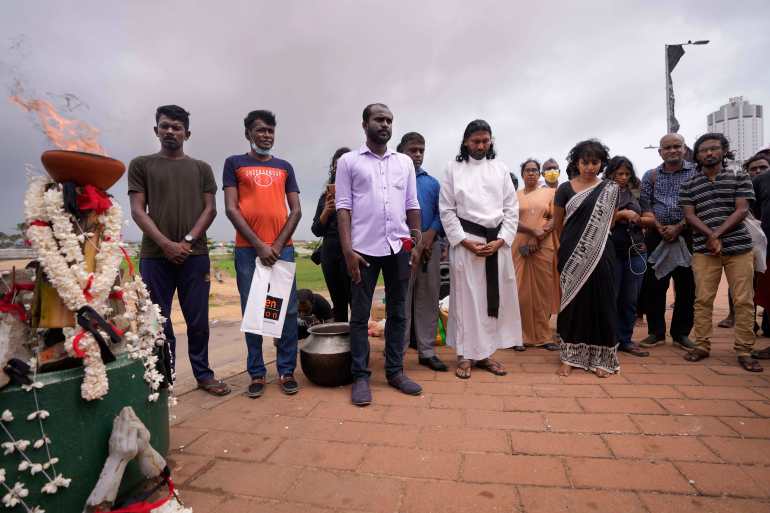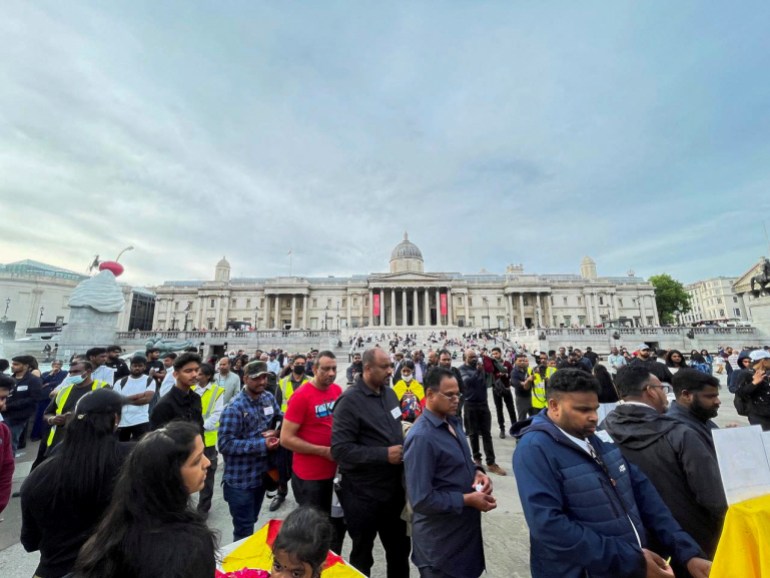Sri Lankans honour Tamil victims of civil war after 13 years
It was the first-ever public event in the island nation where mostly majority ethnic Sinhalese memorialised the minority group.

Sri Lankan protesters have lit flames and offered prayers remembering thousands – including ethnic Tamil civilians – killed in the final stages of the country’s decades-long civil war.
It was the first-ever event in the island nation where mostly majority ethnic Sinhalese openly memorialised the minority group.
Keep reading
list of 4 itemsSri Lanka: Gota needs to go – but so does the ethnocratic state
Why Sri Lankan Tamil refugees in India attempted mass suicide
Sri Lankan troops break up Tamil remembrance of civil war dead
Protesters gathered outside the president’s office in the main city of Colombo on Wednesday, floated flowers in the nearby sea and prayed for all those who died in the 26-year civil war, including Tamil civilians, Tamil rebels and government soldiers.
The head of the separatist Tamil Tiger movement, Velupillai Prabhakaran, was shot dead by security forces on May 18, 2009, bringing a formal end to the bloody ethnic war.
‘Highly welcome’
“This is highly symbolic and very important for Tamils,” said Dharmalingam Sithadthan, a parliamentarian from the northern Tamil heartland of Jaffna.
“In previous years, there were private memorials held in secret, but this public event is highly welcome.”

Clergy from Buddhist, Hindu and Christian communities offered prayers in Colombo and lit a clay lamp for those who perished in the civil war.
“I am a Sinhalese by birth. Today we held a memorial for all those who were killed 13 years ago, Sinhala, Muslim, Hindu and everybody as a result of state terrorism and terrorism by non-state groups,” said Sumeera Gunasekara, a social media activist who participated in the event.
“There are still those who are grieving because of these events and as a Sinhalese I have a right to share in their grief, because I believe in the religion of humanity more than any other.”
Actress Kaushalya Fernando said she came to remember the victims of a war created and mishandled by politicians.
“The significance of this place is that we are not here as different ethnic groups but as Sri Lankans.”
The protesters also shared rice porridge, the only food the people could have in the final stages of the fighting because of the heavy blockade of supplies.
The country’s main Tamil party, the Tamil National Alliance (TNA), said the commemoration showed the majority Sinhalese were willing to support reconciliation after decades of ethnic war.
“This gives us a lot of hope and I hope that Tamil people will also reciprocate,” said TNA spokesman M A Sumanthiran.
“There may be pitfalls along the way, but this is a very good start.”

The civil war killed 100,000 people, according to the United Nations estimates. The actual number is believed to be much higher. A report from a UN panel of experts said at least 40,000 Tamil civilians were killed in the final months of the fighting alone.
Since Sri Lankan troops defeated the Tamil Tiger rebels in 2009, Sri Lankan authorities had widely prohibited Tamils from publicly remembering their family members and have denied allegations that Tamil civilians were killed.
Human rights groups have since accused the country’s military of killing civilians towards the end of the war, in which the rebels fought for a separate state for the Tamil minority.
Sinhalese, mostly Buddhist, make up nearly 75 percent of Sri Lanka’s 22 million people. Tamils, mostly Hindu, represent 15 percent of the population.
UK Tamils seek justice at London vigil
Tamils who resettled in the United Kingdom after fleeing the Sri Lankan civil war also held a vigil in London on Wednesday, with some likening the island nation’s current economic crisis to the conditions they faced during the decades-long conflict.
The gathering of Tamils seeking justice for those from their community who were killed in the South Asian country during the war, coincided with Sri Lanka’s worst economic crisis since its independence in 1948 that has forced out its prime minister.

“The current crisis in Colombo reminds me of our struggles during the war. Shortage of fuel, food, medicine – the Tamil-dominated parts of Sri Lanka faced the same issues then as what the entire nation is facing today,” said Thanikai, 42, who came to the UK eight years ago.
“We need justice for all the people who were killed.”
The UN has accused both sides of war crimes and has been given a mandate to collect evidence. The UN has also warned the failure of Sri Lanka to address past violations has significantly heightened the risk of human rights violations being repeated.
“My parents and friends are still in Sri Lanka but I have been too scared to go back,” said Elilarasi Manoharan, who attended the peaceful demonstration in London’s Trafalgar Square to mark the 13th anniversary of the end of the war.
“But now with the economic crisis and the changes we are seeing, maybe if the Sri Lankan system changes it will open up doors for us to be able to visit our loved ones.”
Sri Lankans have been protesting for more than a month, demanding the resignation of President Gotabaya Rajapaksa and holding him responsible for the country’s worst economic crisis in recent memory.
Gotabaya Rajapaksa played a key role as a top defence strategist to his brother, former Prime Minister Mahinda Rajapaksa, who is credited with leading a military campaign to defeat the rebels.
The two leaders were hailed as heroes by the Sinhalese but allegations of mishandling the economy and corruption have led to their fall from grace.
Mahinda Rajapaksa resigned as prime minister last week amid violent protests, and Gotabaya Rajapaksa has been staying in his fortified residence for more than a month. He has been forced to take a backseat, having appointed a new prime minister to handle the economy.
Sri Lanka, near bankruptcy, has suspended up to $7bn of foreign loan payments due to be repaid this year because of a foreign currency crisis. The country must repay $25bn as foreign debt by 2026 out of a total of $51bn.
It has led to limited imports with no petrol in filling stations. Other fuel, cooking gas, medicine and foods are in short supply, forcing people to stay in long lines to buy the limited stocks.